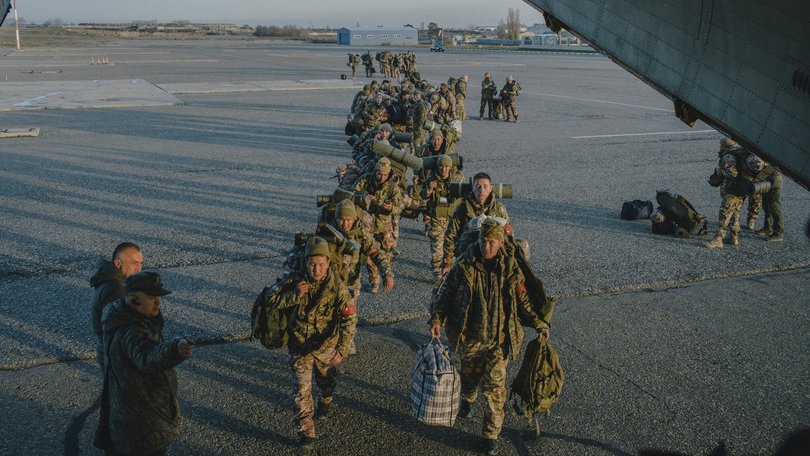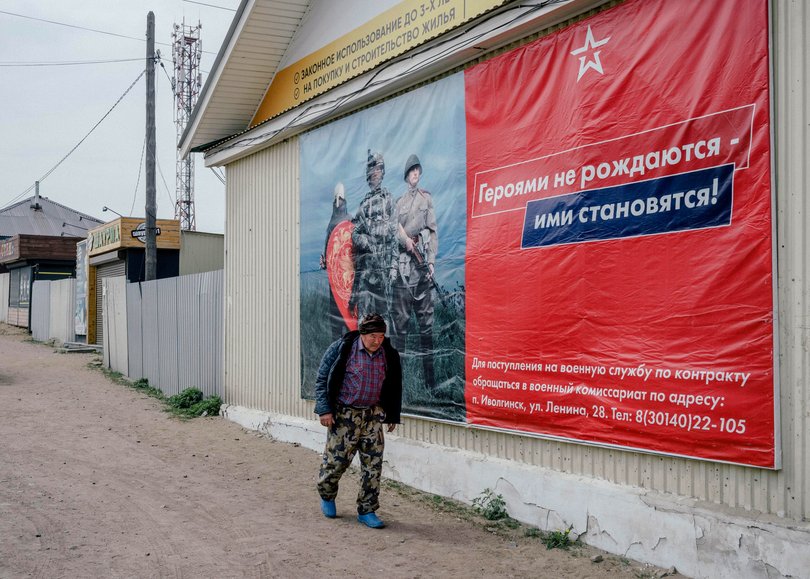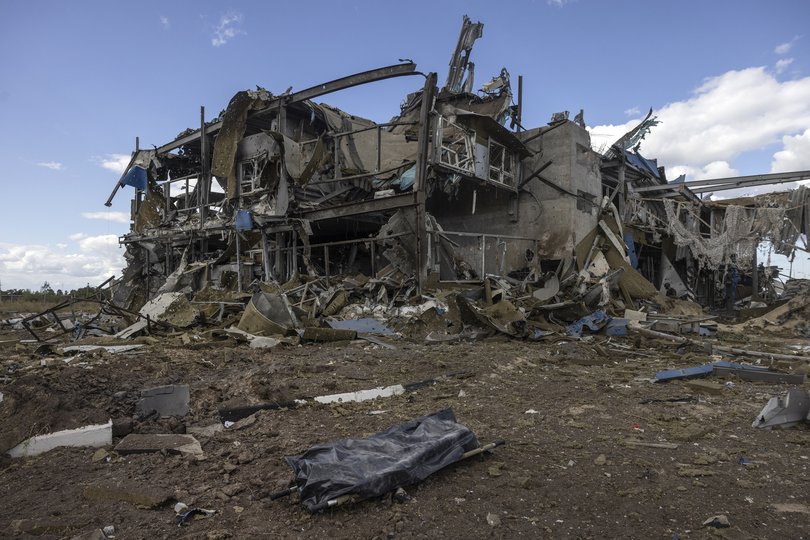THE NEW YORK TIMES: Where is Russia finding new soldiers? Wherever it can
THE NEW YORK TIMES: From murder suspects to immigrants to a former Olympic gold medallist, Russia pressures those it thinks should fight in Ukraine.

Russia has ground through repeated waves of soldiers in Ukraine. It lost some of its most experienced troops at the very start of the invasion, then shipped off tens of thousands of convicts without seeming to care whether they survived.
Now, still desperately seeking sufficient manpower to maintain pressure on Ukraine, Russia has expanded recruitment even more. Men (and women) no longer have to be convicted of a crime — under new laws, any suspects detained by police are informed that pending charges will disappear if they volunteer. The military also is taking anyone with large, unpaid debts; recent immigrants caught in repeated dragnets; and even corrupt officials.
In one recent example from St. Petersburg, two men were arrested on charges of smuggling about 200 kilograms (440 pounds) of cocaine from Peru, worth roughly $30 million, in the roof of a container filled with more than 5,000 cases of mangoes, according to the press service of the St. Petersburg court system. The charges were dropped after the two signed contracts to serve as riflemen in an assault company, the court said.
Sign up to The Nightly's newsletters.
Get the first look at the digital newspaper, curated daily stories and breaking headlines delivered to your inbox.
By continuing you agree to our Terms and Privacy Policy.Local papers nationwide are full of cases of suspected murderers, rapists and thieves who are headed off to war after signing contracts instead of facing trial.
“They can kill people or rob a bank or commit any other crime and then go to the front,” said Ruslan Leviev, a Russian military analyst. The government is “desperate for a lot of people,” he said. “There is a huge rate of casualties on the front line.”
Trying to avoid a draft, the Kremlin has pushed through a series of legal measures in recent months to widen the pool of potential soldiers. The effort has become especially important as Russia seeks to push back Ukrainian lines in advance of an anticipated move by President-elect Donald Trump to end the war when he takes office Jan. 20.
Under a law signed by President Vladimir Putin of Russia in October, the process of joining the military can start from the moment a criminal case is opened. The recruitment of criminals that started in 2022 was limited to those already sentenced to penal colonies.

Chronic debtors across Russia have been the focus of a concentrated campaign from the Federal Bailiff Service. A new law that went into effect Dec. 1 forgives up to 10 million rubles (nearly $100,000) in debts and suspends enforcement proceedings if they agree to fight. That includes countless men with hefty arrears on alimony payments.
Authorities have also been raiding markets, warehouses and railroad stations, or anyplace where they might catch immigrants who recently received Russian citizenship but have not registered for military service. Ordered to provide paperwork at their local draft office, some find themselves whisked off to war.
It is difficult to know the scale of recruitment through these various means because no national tally is available. The military had been recruiting through more traditional avenues — what outside intelligence agencies estimated at 30,000 people monthly — by paying ever larger bonuses to civilian volunteers, but analysts believe the numbers are waning. Offering amnesty is also a cheaper alternative.
“Volunteers from civilian life are quite expensive given all the payments that they have been promised,” Leviev said. “Criminals do not get the same incentives.”
Olga Romanova, the head of Russia Behind Bars, a nongovernmental organization that defends prisoners’ rights, said that the Russian state was severing the connection between crime and punishment, which could have dire, long-term consequences on crime rates.
Were the writer Fyodor Dostoyevsky alive today, she said, he might have to revise the plot of his novel “Crime and Punishment.” Even if police found Rodion Raskolnikov holding an ax dripping blood, all he would have to say is “I want to go to the front,” she imagined, and police would respond, “OK!”
Debates about the consequences of signing contracts instead of facing trial unspool at length online.
When one woman asked whether her husband should sign a military contract, another participant in a discussion group on Vkontakte, Russia’s equivalent of Facebook, noted that her man would earn money and scrub his criminal record clean.
Then the person added, “But I recommend you look for a new husband immediately, it is unlikely to end well.”
An opposition activist and former prosecutor signed a contract because he rated his chances of being killed at the front lower than in prison, given his past work locking up criminals, according to Romanova.
“Russian prisons are one of the most horrible places in the world,” she said in an interview. “The conditions are terrible. Usually, people chose the war because in prison you are no one, you have no rights. In the war, you can at least do something, make some decisions.”
Another source of volunteers has been politicians and state employees jailed on corruption charges. In Vladivostok, the largest Russian city on the Pacific Ocean, two former mayors as well as the director of municipal funeral services, plus several regional officials, have all announced that they want to serve in exchange for getting out of jail.
Oleg Gumenyuk, the mayor from 2018 to 2021, was convicted on bribery charges, as was his predecessor, Igor Pushkarev, mayor from 2008 to 2017. Igor Babynin, identified in the Vladivostok news media as “the king of the funeral business,” was found guilty of bribery and embezzlement.
Some politicians end up in Cascade, nicknamed the “luxury” battalion, which allows the well-connected and well-heeled to avoid combat, analysts said. “All their pictures show them eating lunch, or posing with rifles,” Leviev said. “Their uniforms are clean and new, like they just came from the shower.”
Some politicians have died at the front, especially if they ended up in the Storm Z assault units made up of former prisoners, but they tend to be the exception.
Using the war as a “laundry” to clean reputations has been criticized. “A thief who stole from the state should be in prison,” wrote Aleksander Kartavykh, a military blogger on Telegram. Murderers and rapists might atone for their sins with blood, he said, but not corrupt officials: “With a murderer there is confidence that he will really fight, but with an official, without oversight, there is no such confidence.”

Immigrants who recently acquired Russian citizenship, usually laborers from former Soviet republics in Central Asia, have also been targeted for recruitment. Local newspaper reports nationwide describe enforcement raids that sweep up scores of potential immigrant soldiers.
In the Sverdlovsk region, a man from Tajikistan who recently had acquired a Russian passport said a rumor ran through his community that it would be revoked if he did not register. At the draft office, he said that he and some colleagues received a list of needed documents.
When he returned a couple weeks later with the paperwork, every immigrant there was handed a summons for military training. He was only let go later because three buses proved insufficient to take all the men, said the man, who spoke on the condition of anonymity for safety reasons.
Police officers in many regions earn an incentive bonus of about $100 for every suspect they sign up, said Romanova, while in wealthier Moscow the amount is $500.
Court records indicate that 1 suspect in 5 being arraigned becomes a soldier, she said, but they can sign up any time during the judicial process. Overall, Russia has about 106,000 spots in its penal colonies, and although previous recruitment drives reduced the prison population by about half, she said, authorities were now trying to rapidly fill the vacant spots in hopes that suspects would rather fight.
Those who refuse, however, often face investigators who vow to let them rot in jail.
Years ago, Andrey Perlov could walk faster than any man on Earth, winning the gold medal for Russia in the 50-kilometer race walk at the 1992 Barcelona Olympics.
Perlov, 62, does not walk much these days, stuck in a prison cell in Novosibirsk, in Siberia, since March, charged with embezzling about $30,000 from the soccer club where he was general manager.
Investigators have not presented any evidence publicly, said Alina Perlova, his daughter, instead repeatedly prolonging his detention while pressuring him to go to Ukraine. The Novosibirsk Regional Court could not be reached for comment.
“For them, the best option is for him to go to war,” Perlova said in an interview. “The case would be closed, and nobody would be responsible for making the mistake of putting him in jail.”
Investigators have threatened to keep him locked up for a year or two as the case crawls along, she said, adding that their basic attitude is, “Let him go to the front at age 62 — no matter, he is an athlete.”
If the Kremlin showers current medalists with cash and gifts like foreign luxury cars, in those early days of the Russian Federation, President Boris Yeltsin gave Perlov a watch and the money to buy a local Lada car, Perlova said. His family, including his wife and a son, subsisted on his $1,000 monthly pension, plus the small fees that his daughter earns translating Chinese literature. Now his accounts are frozen.
Occasionally, her father wavers, thinking that he should go to war so his family can get money, despite the danger and that signing would be tantamount to admitting guilt.
“I keep saying, ‘Dad, no, please, we will find a way,’” Perlova said.
This article originally appeared in The New York Times.
© 2024 The New York Times Company
Originally published on The New York Times
